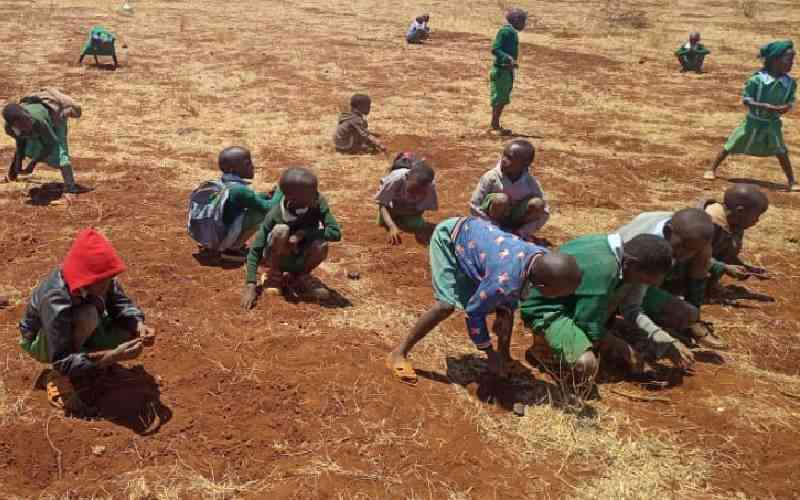
Hunger and starvation. These are the two ugly situations staring at learners especially among public primary schools in semi-arid Ukambani counties, driving children to stay away from schools.
The sad state of affairs has been occasioned by three consecutive seasons of failed rains with families already having exhausted their food reserves.
In Makueni County, National Drought Management Authority (NDMA) reports that about 219,000 people are in dire need of food from 54,000 households with the most affected being children under the age of five and lactating mothers.
"Families have already depleted their food reserves since rains were witnessed three years ago. Children have been affected badly, especially that they have to go to school and depend on one meal, which to most families is missing," said Daniel Mbuvi, Makueni NDMA coordinator.
Schools from 15 wards out of the Makueni's 30 wards are in a big food crisis situation.
"The situation is worse in regions such as Kibwezi East, Kibwezi West, Makueni, lower Mbooni, and some parts of Kilome," said Mr Mbuvi.
"There is availability of food in the market but the problem is low purchasing power amongst the families. There are also low prices for animals where families are selling their livestock at a throw away price-a price that is not corresponding to the high food prices," he added.
- Misdiagnosis, climate change to blame for pathogens' resistance to drugs
- We need to talk to our children about climate change
- Climate justice and conservation are undeniably interconnected
- Scorching truth: How climate change aggravates brain diseases
Keep Reading
From the Makueni nutrition department, a sample taken of 176 children across the affected regions last month, 8.4 per cent of these children exhibited moderate risk of malnutrition.
A total of 186 public primary schools across the county have sent an outcry through the Sub-county Directors of Education-with total of 47,421 learners. The county has 903 public primary schools.
Through the response initiative of the County Steering Group, ADRA and Action Aid organisations are supporting feeding in a separate set of schools.
ADRA is supporting seven schools in Mtito Andei zone in Kibwezi sub-county with 1,008 learners. The intervention will last up to November 2022.
In Kathonzweni Action Aid was supporting some 26 schools with feeding last term. This term the organization is only facilitating water trucking to boarding institutions and water needy schools in Kithuki, Kanzokea and Kanthuni sub-locations in Kathonzweni.
A spot check by Sunday Standard on several schools reveals that pupils have been reporting to school without carrying lunch meals in their dishes.
"You can find that in a class of 50 pupils only five are reporting to school in the morning carrying lunch meals. We are forced to keep their foods in the staff room because if we leave the food in the classrooms, it might affect some who can't afford a meal or be stolen," a teacher at Tango primary school, at Salama, Kilome sub-county, who requested anonymity, told Sunday Standard.
Mwaiwa Julius, Kenya Primary School Head Teachers Association Kibwezi branch chairman, said that at Utiithi primary school about 50 of its 256 pupils failed to report last week.
He said at Kikunduku primary school about 80 out 289 pupils have not reported since the third term commenced.
At Athi Kamunyuni with 220 pupils, Mwaiwa said 100 pupils have also not reported since third term started. All these schools, he said are in Kibwezi East constituency.
At the lower parts of Makueni such as Masongaleni ward and Mtito Andei wards, pupils have been forced into the forests in search of wild fruits such as baobab fruits-common mammoth trees in tropical regions of Africa.
The pupils turned hunters and gathers are reported to have common fruit gathering grounds however, the drought is still drying their natural food sources.
"Children have become very common under the baobab trees as they search for fruits because when they are absent from school. They too find no food at home. A school feeding programme can hold learners back to classrooms," said Mutungi Kiminza, Masongaleni assistant chief.
Kibwezi West MP Mwengi Mutuse calls on the government to fast track the relief food distribution programme and consider reintroducing school feeding.
"The situation is grave. We want to urge the government agencies mandated by the president with the food distribution process, and other humanitarian agencies to intervene because we can't take any more time to have the situation arrested," said Mutuse.
Kibwezi West has the biggest number of the affected population with a recent government animal off-take programme having come into an end-but the situation looks the same.
"You can't feed these young children with meat. The government was buying animals, slaughtering and giving the meat freely to families, you can't feed on meat only, we need maize and beans," said Mwende Mumbua, a mother of seven from Makindu.
In Machakos, a high number of learners mainly from the predominantly semi-arid sub-counties of Masinga, Mwala and Yatta have been forced out of school.
Several school heads, who spoke to Sunday Standard, described the situation as extremely alarming and called on the government to immediately dispatch food supplies to support the school feeding programme.
"The fact of the matter is that famine has hit us hard and our children have been worst affected. Some report to school while hungry while a significant number have temporarily dropped out because of lack of food. The situation must be arrested before it gets out of hand," said a head teacher of a primary school in Masinga sub-county.
Kenya National Union of Teachers (Knut) National Executive Committee Member, Kasimba Ngui also called for the immediate resumption of the school feeding programme.
Kasimba lamented that the failure to disburse capitation for the programme has dealt a big blow to learning.
"The situation is bad. I have visited about 11 schools since the term began and I have found that nearly 30 per cent of learners are not attending school. This high rate of absenteeism will definitely take a toll on the performance of children," Kasimba told The Sunday Standard in a telephone interview.
He noted the situation has been made worse by the sudden surge in food prices in the market.
"Food prices have gone through the roof yet some principals had budgeted for Sh3,000 per bag of maize but the prices have now gone up to Sh6,000. These unstable prices have made it a nightmare for principals to run their institutions," he said.
At the same time, an education official, who asked not to be named, said day schools have been worst affected because parents are supposed to cater for lunch and majority of them are currently not able to do so.
"This has affected learners to the extent that serious absenteeism is now being experienced in many schools," the official said.
Kangundo West MCA Charles Mbuva urged the Government to consider all regions in the disbursement of school feeding capitation, saying that poor harvest was experienced even in regions considered highly productive.
"Even a region like Kangundo which has traditionally been classified as highly productive has been badly affected. Our farmers have harvested nearly nothing for two consecutive seasons," said Mbuva.
And in Kitui, a number of schools in most parts of the larger Mwingi need interventions.
School teachers, especially in primary schools and Early Childhood Development Education Centres (ECDEs) are a worried lot because children cannot concentrate in class due to hunger pangs.
Some of the learners skip school to join their parents in doing menial jobs such as fetching water with donkeys from far flung areas for sale as well as breaking ballast at construction sites to put food on the table.
"We have not been able to harvest anything in our farms for the last two years. Life is getting harder by the day. While we want our children to study, it becomes very difficult to push them to school on empty stomachs," laments Zablon Mwinzi from Mivukoni in Mwingi North.
He says on a number of occasions, his three school going children idle at home when there is nothing to eat.
The dire situation has left teachers at a cross roads with some having to dig into their own pockets to provide food for young learners to keep them in school.
Rebecca Muasya, an ECDE teacher at Ndithi Primary School in Mwingi North, says teaching has become harder when learners cannot concentrate in class.
"As teachers, we are forced to pool resources and buy food for the young kids who hardly concentrate in class after coming to school on empty stomachs," Muasya said.
The teacher disclosed that a number to learners have abandoned school altogether.
"A number of them have stopped coming to school. Parents admit that with nothing to feed children at home, schooling becomes a burden," she noted.
David Mutua, a parent with two learners, said times are tough as he solely depended on green grams farming to educate his children but the venture has since collapsed.
[Reports by Stephen Nzioka, Erastus Mulwa and Phillip Muasya]
 The Standard Group Plc is a multi-media organization with investments in media platforms spanning newspaper print
operations, television, radio broadcasting, digital and online services. The Standard Group is recognized as a
leading multi-media house in Kenya with a key influence in matters of national and international interest.
The Standard Group Plc is a multi-media organization with investments in media platforms spanning newspaper print
operations, television, radio broadcasting, digital and online services. The Standard Group is recognized as a
leading multi-media house in Kenya with a key influence in matters of national and international interest.











